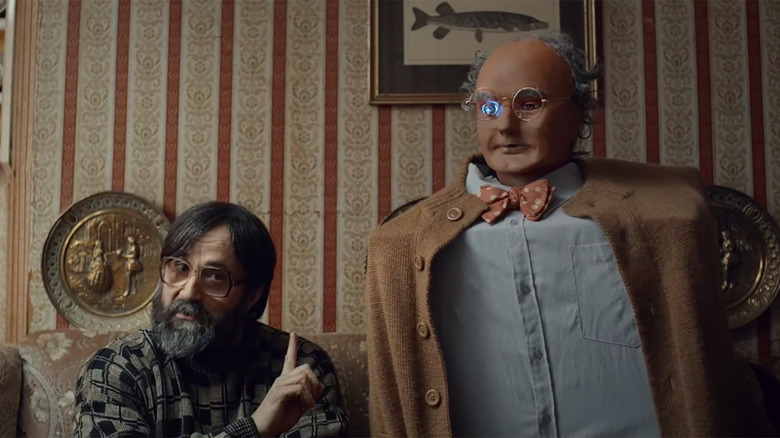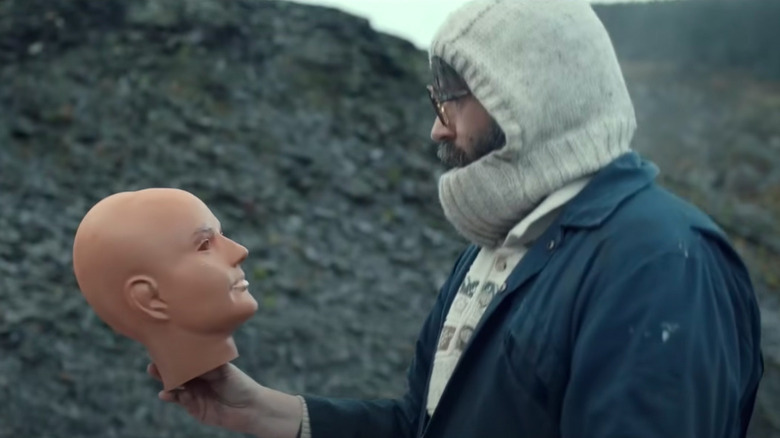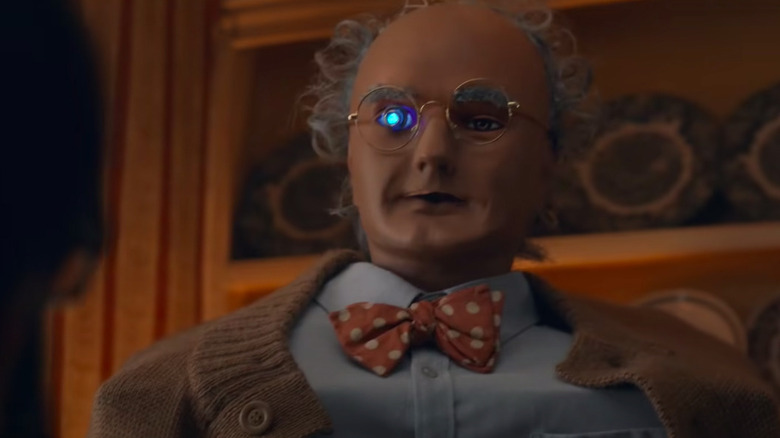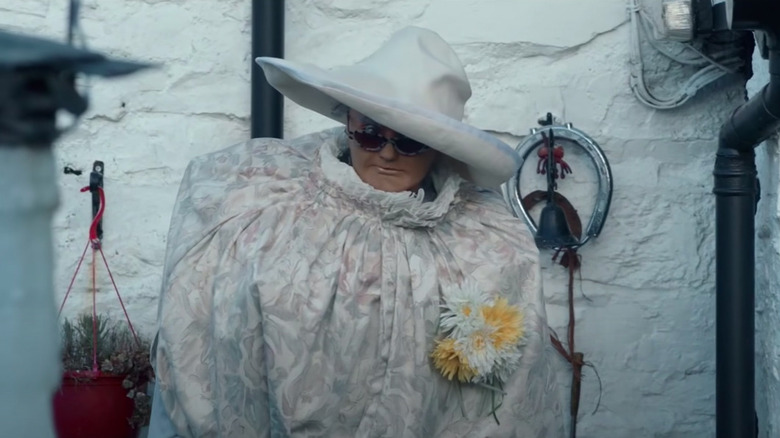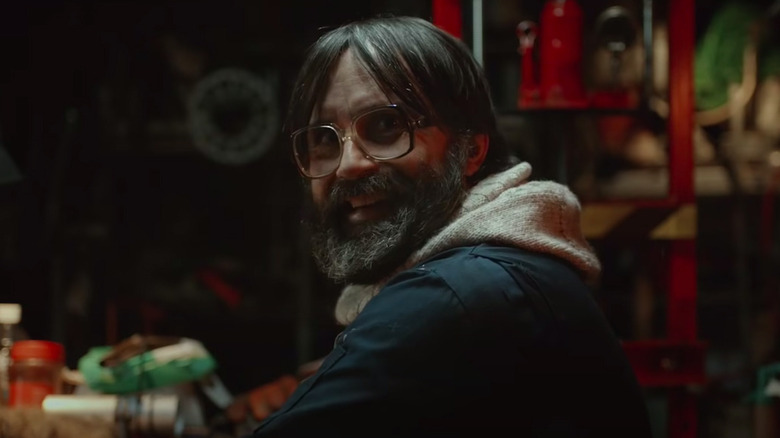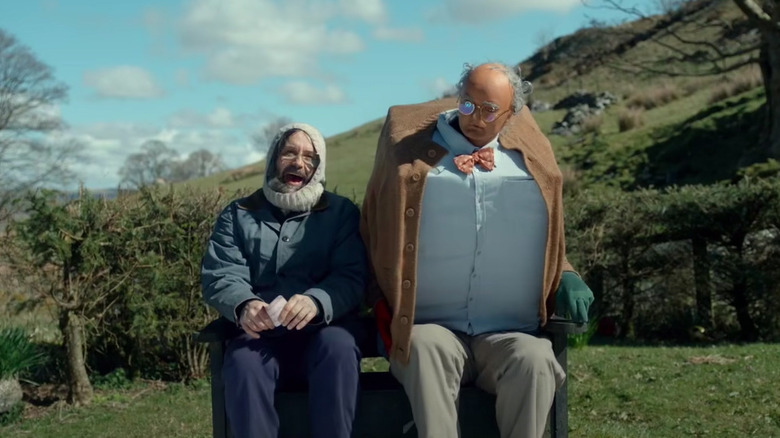Brian And Charles Writers & Stars Discuss Character Origins, Abandoned Story Ideas & More [Interview]
"Brian and Charles" made a splash at the beginning of the year with a premiere at the 2022 Sundance Film Festival. The quirky, charming, and hilarious buddy comedy follows a small town, reclusive inventor named Brian who manages to build himself a sentient robot friend called Charles, giving himself a fascinating and fun new friend to pal around with. But when Charles begins to get more curious about the world outside of his countryside farmhouse home, Brian's robot friend proves to be more than he's ready to handle.
David Earl and Chris Hayward created the characters of Brian and Charles over a decade ago, with Earl playing Brian and Hayward sitting inside the boxy body of the makeshift robot while computer software acted as the robot's voice. The duo first starred in radio and improv shows before being at the center of a mockumentary short film in 2017. Also titled "Brian and Charles," the success of the short inspired them to make a full-length feature film, and it's finally arriving in theaters today. Leading up to the film's release, we spoke with Earl and Hayward about the origins of Brian and Charles, some of the drastically different storylines they considered for the film, the silly inventions that didn't make the final cut, and much more.
'It was quite a long process to work out what their overall journey would be'
"Brian and Charles," I absolutely adore this movie. It's so just charming and quirky and hilarious. The first thing I wanted to ask is, what was the process like of adapting the short and turning it into a feature? How did you figure out how to expand it into the longer story?
Hayward: We just came up with lots of different story ideas at first, really. Just all between us. We just came up with lots of different ones, worked out what felt right. It was quite a long process to work out what their overall journey would be.
Earl: Sometimes, we feel like we'd go too far away or we'd get a bit confused and go back to the short and remind ourselves what we liked about that. And that would kind of help, wouldn't it?
Hayward: Yeah. It's just a long process of working out what the drama would be. It was easy working out what the comedy would be, or easy-ish, but the drama was like trying to work out a puzzle.
What were some of the storylines that you thought of that didn't end up in the feature?
Hayward: I think initially it was how Brian was going to encounter Charles. So we had a version where he was walking down a lane feeling lonely. A truck drives past, and a box falls off, and Charles is inside the box. Part of his story at that point was he was from Japan and he wanted to get back to Japan.
Earl: We had one idea where Charles died and Brian recreates him. Except this time he's 30-foot tall and Brian rides him like a horse.
Hayward: Yeah, all sorts of weird ideas for it. We had a version where Brian wasn't an inventor, but he was a conceptual artist, who built art projects. But that was just too weird to try and explain exactly. That doesn't make any sense. So we just went, "You know what, he's an inventor," just makes it easier.
'What? That's just a bloke in a box, right?'
What was the process like for creating Charles? Because he's a very makeshift robot with a simple design. How did you figure out how simple to make him or how advanced to make him technologically?
Hayward: Well, we started off doing it as a live comedy show. So back in those days, we just needed something really simple that we could perform live and that we could practically do just between us. That's why it was just like a cardboard box and mannequin head and a really big pair of trousers. Because we didn't really deviate from that when we made the short film, and because the short film went down so well, when it came to doing the feature, we thought, "Well, we're quite happy with pretty much what he looks like. So if that works, why change it?"
Earl: Also, I think we quite liked the idea that the audience would be watching it thinking, "What? That's just a bloke in a box, right?" We quite like that cheeky side of it.
Where did the voice come from?
Hayward: That began when David used to do stand up as Brian, and he had his own little radio show, internet radio show, and our producer Rupert would call in, but he was too nervous to talk. So instead, he would use this voice computer software to type what he wanted to say, and it would read out in various weird voices, one of which was Charles. So I heard their conversation, and it was just so funny that, between us, we started talking about doing it live. So we kept that voice from the computer software program. When we did it live, I would be in the box as Charles, David would be Brian, and then Rupert would be able to activate these different voice cues and type speech as Charles, if that makes sense.
Yeah, that's fantastic, I love that.
Hayward: Yeah. It worked, because we enjoy doing it live and because it entertained or freaked people out at the comedy gigs, we just decided to keep what we started with.
That's great, because there's so much comedy that comes from how odd the voice sounds saying certain words and the inflection on certain syllables.
Hayward: Yeah, what I love so much about when they used to do it on the little radio show, David would ask a question and there would be a pause while Rupert typed the answer. So there was this awkward pause where you would be just waiting to hear, and often he would just say, "No."
[Everyone laughs]
Hayward: Or, "Yes." So, yeah, it was just really funny. It just made a really weird conversation even weirder.
Earl: And it also makes Brian quite patient. He's just sort of patiently waiting, admiring his little friend.
'Between takes, I couldn't really take it off'
Where did the name "Charles Petrescu" come from? I know in the movie, we see a shot of a book where the author has the last name. Was that a real book or is that something that you made for the movie to provide an origin for the name?
Hayward: That's something we made up, but originally, the name Charles was actually the name of the voice option that Rupert selected. Then, Petrescu — Rupert is a soccer fan, and his favorite team was Chelsea, and there used to be a soccer player whose second name was Petrescu. So he basically, off the top of his head, just said, "Oh yeah, it's Charles Petrescu." It's as simple and as semi-boring as that.
That's great. Did you guy find any difficulties, once you got Charles on set, was it difficult to see and maneuver and hit your marks?
Hayward: All of those, yeah. I couldn't really see anything. I'd have to be led around by the hands, like put into position. If I had to walk fast, that was really difficult, because I just didn't know where I was going. So yeah, it was quite cumbersome. And I was also sewn into it. So between takes, I couldn't really take it off. So I had to just sit in the chair and listen to people having conversations around me that I couldn't participate in.
The sets in this movie are so detailed, and there's just so much stuff in the background to notice. How much thought did you put into those little details? Are there certain things that viewers might not catch on the first time around?
Hayward: Well, we were really lucky. We had an amazing location scout, and they were also very lucky with the locations they found. One of the first farmhouses that they inquired at pretty much already looked exactly how we imagined it. It had a big workshop, the shelves were full of junk and bits of metal, and we didn't really need to add too much to it to make it look as cluttered as we imagined Brian's workshop. So we just got really lucky. The farmhouse that we filmed in, again, we didn't really need to do much, because it already looks amazing. It had really crazy wallpaper, and we just got really lucky with the locations.
Were there any inventions that didn't make the final cut of the movie?
Hayward: Yeah, we had quite a few. We had snake scales. That was a pair of scales that Brian said he weighed snakes on. We basically had an improvised take, and David hadn't seen any of these props before, and the idea being, we just try to improvise and see what we could get.
That's fun.
Hayward: Yeah, so we had various ones. What else did we have? Can you remember, David, what other things we had in there?
Earl: Yeah, I don't really want say because it's embarrassing.
[Everyone laughs]
Earl: We had two ladies attached to a coat.
Hayward: Oh yeah, called the Sisters of Swansea.
[More laughter]
Hayward: But I think the best ones made in.
'There are certain scenes that are fully improvised'
Because there's a lot of improvisation that you guys have done with these characters, were you able to do that on set as well, or was a lot of the improvisation done beforehand to polish the script? Because I imagine it might not be super easy to do improv when you have to deal with creating the lines in Charles' voice and having the response timed with whatever you might come up with on the day.
Hayward: Yeah, we stuck to the script pretty much all the time. We had Charles' dialogue all prerecorded, but there are certain scenes that are fully improvised. For the most part, we stuck to the script. But the good thing about Charles is, in post-production, we could change his dialogue. Because, obviously, we just add it in post, so we could tweak his lines. There are scenes that we ended up completely rewriting in post with Charles. We could just have him say whatever we wanted. So up until the final sound mix, we were still adjusting things to make it either as funny or as sad as we wanted. So that was good.
That makes sense. How much of the characterization of Brian and Charles that was formed in all these years before the movie make it into the story? Did a lot of it come only while you were writing the script, or did this long history actually inform the story you wanted to tell?
Earl: I don't think it did, really. I think like the stage show, the live, and the radio felt like a different kind of thing.
Hayward: Like the stage show was much more boisterous, because often it's a comedy club late at night, where we're performing for, essentially, drunk comedy fans. So that was a bit more boisterous, but that took a while just to hone exactly what their characters would be. But we knew what worked in a comedic sense. When they argue, that was often funny, kind of winding each other up. We did take a while, for the film, to work out what their characters would be. Often it was a matter of just softening them a little bit and making them a bit more realistic.
'You don't know if it's going to be a pile of s***'
Obviously, this is a big step forward in bringing these characters to life and for your careers. Are there any grand ambitions you have moving forward from here as far as projects you'd like to tackle?
Hayward: Well, I think we just sort of took it a step at a time, really. Like when we made the short, we didn't really think anything was going to happen with the short film. We just wanted to get online. Then, when we had the film commissions, we didn't even think it would get made. We just wanted to write the script. Then, when it got made, we were like, "Okay, that's amazing. We've got it made." So now we're just waiting to see what happens next. But yeah, we do love those characters and they're obviously really fun to do, so even though we haven't really decided quite what to do yet, I'm sure we'll do something with them at some point.
So you're hoping to do another story with Brian and Charles? The ending certainly lends itself to seeing them go on adventure together next time.
Hayward: Yeah. I mean, before we had the film commissioned, we were talking about whether it'd work as a TV show or as a film. So we were kicking around various stories and ideas. I guess, at the moment, we're just waiting to see how well it gets received and take it from there.
If there was any sort of advice that you would have for aspiring filmmakers out there, based on your experience, what would it be?
Earl: I would just say, I think what's really useful is doing the short film, because you can prove to others that it can work. But I think you prove to yourself [too], because we made it, and we saw what it was like on screen, and we thought, "Oh, this works. We really like it." So I think that's a really useful thing, to just go out and make a short and prove to yourself that it works. Before, I think when it's just down on paper, you are kind of guessing when you hand it over to someone, and you don't know if it's going to be a pile of s***. I think it's better to get it on the screen and say, "Yeah, this works," or, "This doesn't work," and then take it out.
Hayward: I think if we'd have submitted the film just as a script, I don't think it would've got made at all.
Earl: No way.
Hayward: You really have to see Charles to believe him.
Thanks guys, I'm definitely going to be telling everyone to see him as soon as I can.
"Brian and Charles" is in theaters now.
